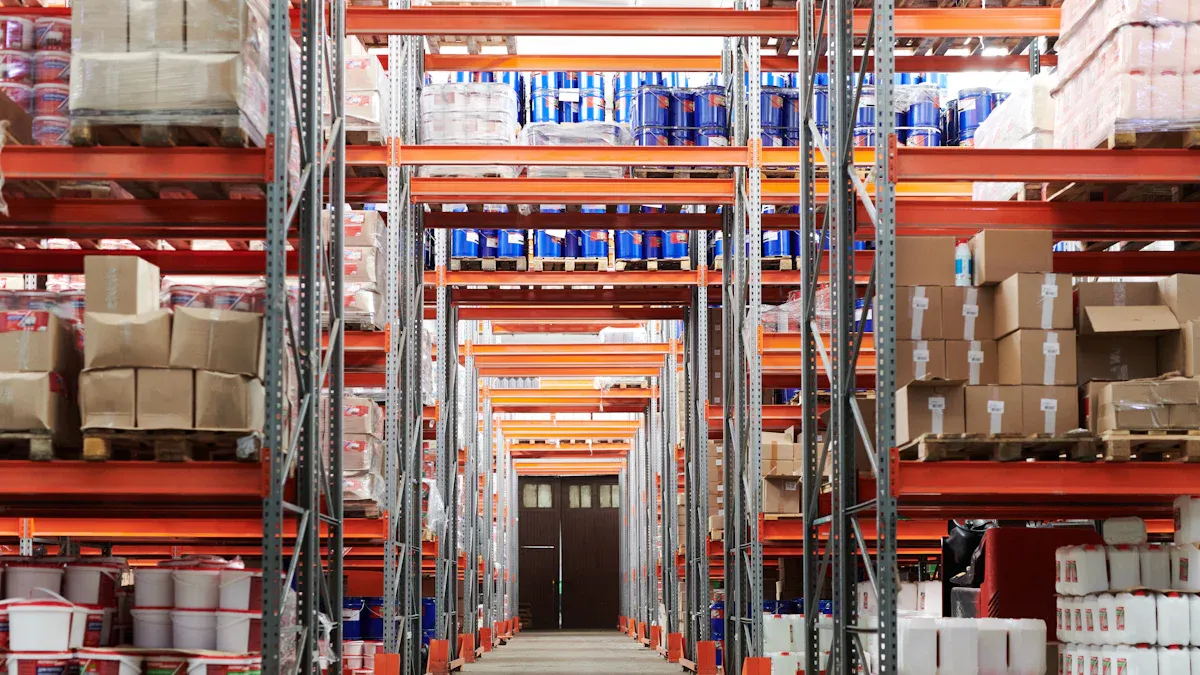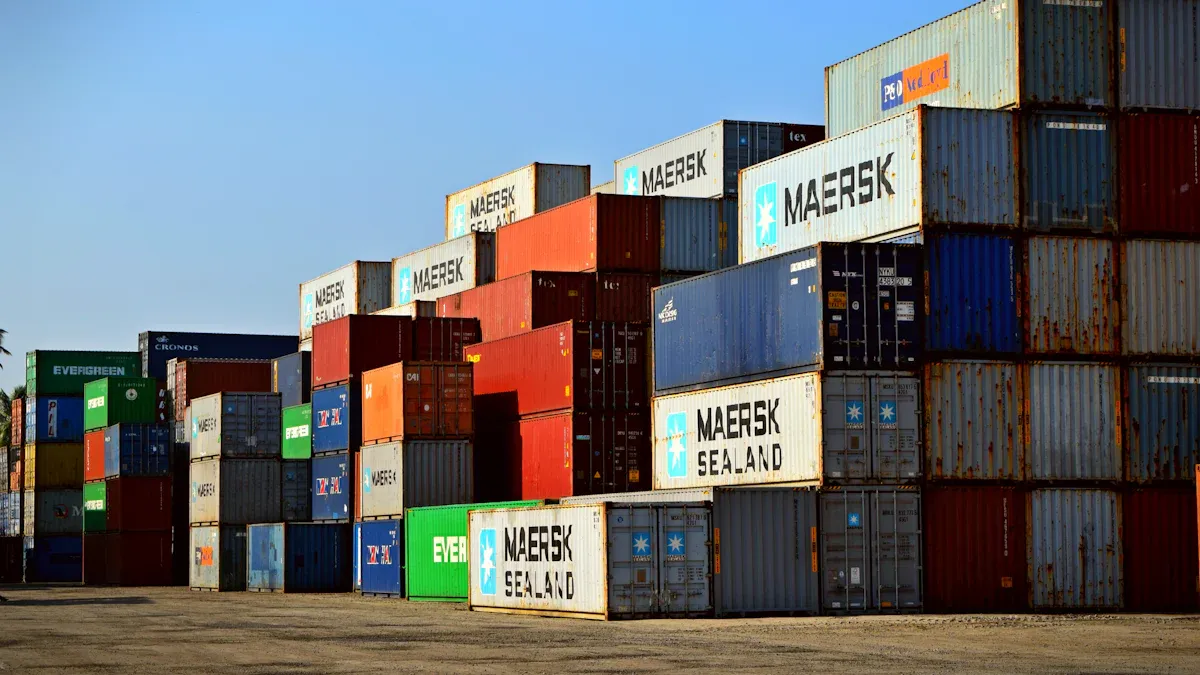How to Choose the Right Overseas Warehouse for Your Business in 2025

Choosing an overseas warehouse can help your business grow. It’s not just for storage—it helps manage supplies and keeps customers happy. Why is this so important in 2025? Here’s why:
36% of companies now use technology to improve supply chains.
Moving warehouses closer to home is becoming more popular.
Over 60% of businesses have trouble tracking supplies, so pick an overseas warehouse that makes things clearer.
Choosing the right overseas warehouse helps your business succeed in a changing world.
Key Takeaways
Pick a warehouse near customers and trade centers to save time and money.
Know all costs, even hidden ones, before agreeing to avoid surprises.
Choose a warehouse with good tracking systems for better accuracy and speed.
Strategic Location for Your Overseas Warehouse

Picking the best spot for your warehouse is crucial. It’s not just about storing items. It’s about getting products to customers fast and cheap. Let’s explore what makes a location smart.
Close to Customers and Trade Hubs
Being near customers and trade hubs is super helpful. Why? It cuts delivery times and shipping costs. Picture your warehouse near a busy port or airport. Goods move faster, and customers stay happy.
Take Houston as an example. The Port of Houston is a big deal. Here’s why:
Evidence Description | Key Insight |
|---|---|
Shows the port’s importance for logistics and storage space. | |
Close to industrial areas | Helps create smooth and easy logistics operations. |
Strong link between the port and industry | Makes Houston a top logistics hub, improving supply chains. |
Choosing a spot near trade hubs boosts your business. It’s like giving your supply chain extra power.
Local Rules and Compliance
Every area has its own business rules, especially for imports and exports. Some places have strict customs, others are easier. Learn these rules before picking a spot.
For example, shipping electronics might need special papers in some countries. A warehouse in a simpler area saves time and stress. Check how local laws fit your needs. It’s not just about following rules—it’s about avoiding problems later.
Easy Transportation Access
Think about how goods will move to and from the warehouse. Is it near highways, railways, or ports? A connected spot saves time and money.
For example, a warehouse by a highway speeds up city deliveries. Near a port? International shipping gets easier. Good transport links mean fewer delays and happy customers.
When choosing a spot, ask: Can trucks, ships, or planes get here easily? If yes, you’re on the right path.
Cost and Value of an International Warehouse
Picking an international warehouse means knowing all the costs. It’s not just about the price you see first. Think about running costs, hidden fees, and if it fits your budget. Let’s break it into simple parts.
Upfront Costs and Daily Expenses
First, there’s the upfront cost. This includes renting the space and setting up. But don’t forget daily expenses. These include power, workers, and repairs. Costs depend on the warehouse size and services.
For example, a warehouse with tracking systems may cost more. But it can save money by working faster. If quick delivery is key, paying for automation might be smart.
Hidden Fees and Long-Term Deals
Hidden fees can surprise you later. They’re often in the small print of contracts. Watch out for these:
Extra charges for tasks not in the deal.
Fees for special handling or checking quality.
Fines for not meeting minimum use rules.
Higher shipping rates than expected.
Extra storage fees for using too much space.
Costs for keeping goods too long.
Fees for handling returned items.
Charges for linking your systems to theirs.
Fees for canceling or changing orders.
Overtime pay during busy times.
Costs for fixing mistakes in the process.
These fees add up and hurt your budget. Always ask for a full list of costs before signing. Clear agreements help avoid surprises and keep spending in check.
Balancing Price and Service Quality
The cheapest warehouse isn’t always the best. Low prices might mean poor service. Bad inventory or slow shipping can cost you more later.
Find a warehouse with extra services like packing and tracking. These make things faster and keep customers happy. For example, advanced tech helps manage stock and cut waste. If you’re growing worldwide, pick a warehouse that grows with you.
The right warehouse isn’t just storage. It’s a partner that helps your business succeed. Check costs, hidden fees, and services to make the best choice.
Checking Services in a Fulfillment Warehouse
When picking a fulfillment warehouse, think beyond just storage. The right services can help your supply chain work better. Let’s look at what matters most.
Shipping and Order Handling
A good warehouse ships products fast and without mistakes. Accurate orders and quick delivery are very important. Here’s how to check their work:
Metric | What It Means | Good Score |
|---|---|---|
Shipping Accuracy | Orders sent with no mistakes in items or addresses. | |
Order Accuracy | Orders delivered correctly, not counting shipping problems. | Over 99% |
Order Fulfillment Time | Time from order to delivery. | Short times |
These numbers show how well a warehouse handles orders. High accuracy means fewer errors. Short times mean faster delivery. Focus on these to find the best warehouse.
Inventory Tools and Tracking
Good inventory systems keep things running smoothly. Tools like barcodes and RFID track items in real time. This helps avoid mistakes and lost goods. Here’s why it’s useful:
Automated tracking stops items from getting lost.
Full tracking helps plan better and avoid waste.
Neat storage saves time and lowers labor costs.
Faster processes mean quicker deliveries.
With these tools, your business can grow without problems. A warehouse with strong systems keeps your supply chain flexible.
Special Services for Your Business
Every business has different needs. Your warehouse should match those needs. For example, electronics may need clean rooms or secure storage. A warehouse with special skills can handle these tasks.
Extra services like labeling or packaging can save time and money. These extras turn a simple warehouse into a helpful partner. The best warehouse doesn’t just store items—it helps your business succeed.
Scalability and Flexibility in the Right Distribution Warehouse
Picking a warehouse that grows with your business is important. It should also adjust to changes in demand. Let’s see how the best warehouse can help you succeed.
Handling Growth and Busy Seasons
Your business will grow over time. Growth means more orders, bigger stock, and new markets. A good warehouse uses its tools and workers to help you expand. Letting experts manage logistics gives you time to focus on your business.
Busy seasons, like holidays, bring more orders. Without planning, you might run out of stock or face delays. Flexible warehouses, like those using 3PL providers, can handle busy times. They make sure everything runs smoothly, even when orders increase.
Custom Services for Your Business
Every business has unique needs. Warehouses should match those needs. For example, electronics may need clean spaces or secure storage. Retail businesses might need special packaging or labels.
The right warehouse does more than store items. It helps your business work better. Custom services keep your supply chain strong, no matter your industry.
Preparing for the Future
Planning ahead is smart. A scalable warehouse uses technology to stay ready for changes. Tools like automation and tracking systems make work faster and easier. These features help your business grow and stay competitive.
Choosing the right warehouse solves today’s problems and prepares for tomorrow. Flexibility, custom options, and technology keep your business strong in any situation.
Security and Compliance in Picking the Right Warehouse
When picking a global warehouse, safety and rules matter most. A safe and rule-following warehouse protects your goods and reputation. Let’s look at what you should check.
Keeping Goods and Data Safe
Warehouses store goods and important data. Without good safety, theft or hacking can happen. Here’s why this is important:
The Equifax hack showed how bad security risks data.
Break-ins lead to stolen goods and slow business.
Vandalism damages property and causes delays.
To avoid these problems, choose warehouses with cameras, locked doors, and strong cybersecurity. A safe warehouse keeps your items and information secure.
Following Trade Rules
Every country has trade rules. Breaking them can mean fines or delays. Warehouses that know these rules make things easier. For example, some places need special papers for electronics or medicine.
Pick a warehouse that knows international trade laws. They’ll handle customs and make sure shipments follow the rules. This keeps your business running smoothly.
Planning for Problems
Problems can happen anytime, but good warehouses plan ahead. Risk planning means finding threats and making solutions.
Factor | What It Does |
|---|---|
Numbers | |
Action | Helps plan and use resources wisely. |
Result | Follows rules and avoids big problems. |
Warehouses with risk plans can change schedules and prepare for issues. This helps your business stay strong during tough times.
By focusing on safety, rules, and planning, you’ll pick a warehouse that protects your business and helps it grow.
Technology Integration in Modern Warehousing

Technology is making warehouses smarter and faster. Tools like WMS, automation, and tracking help businesses improve. Let’s see how these tools can make a difference.
Advanced Warehouse Management Systems (WMS)
A WMS works like the brain of a warehouse. It helps track inventory, manage orders, and plan tasks better. This saves time, cuts costs, and keeps customers happy.
Here are some examples of WMS benefits:
A German store cut picking time by 25%. Their WMS made routes faster, improving delivery times.
A factory saved 15% on inventory costs. Predictive tools helped them avoid waste.
A 3PL company sped up catalog tasks by 30%. Their WMS improved efficiency and customer service.
These examples show how WMS makes work easier and results better.
Automation and Robotics in Warehousing
Robots can move goods or pack orders for you. Automation isn’t just cool—it’s useful. It reduces mistakes, speeds up work, and lowers labor costs. Robots handle boring tasks so workers can focus on important jobs.
For instance, robots sort items faster than people. This means quicker shipping and happier customers. Adding robots to your warehouse can give you an advantage.
Real-Time Tracking and Analytics for Transparency
Knowing where your goods are all the time is key. Real-time tracking gives instant updates. You can fix delays, solve problems, and keep customers informed.
Analytics tools also help you make better choices. They show trends, predict needs, and find areas to improve. These insights make your warehouse more reliable and efficient.
Tip: Use technology to stay ahead. It’s not just about keeping up—it’s about leading the way.
Practical Tips for Choosing the Right Overseas Warehouse
Visit and Check Warehouses in Person
Before choosing a warehouse, try to visit it. Seeing it yourself shows how it works. Check if it’s clean, organized, and secure. Are shelves neat and labeled? Is the staff quick and skilled? These things are important.
Watch how they handle orders. A good warehouse tracks inventory well and ships fast. If you can’t visit, ask for a virtual tour or photos. This step helps you avoid problems later.
Read Contracts Carefully
Always read contracts before signing. Some have hidden fees or tricky terms. Check for storage costs, usage rules, and early exit penalties.
Ask about extra services like packing or labeling. These can save time and money. A clear contract helps you know what you’re paying for and getting.
Ask Experts and Check Reviews
Talk to experts for advice on warehouses. They can guide you to the best choice. Also, ask the warehouse for references. Speak to other businesses they’ve worked with.
Learn if they deliver on time and handle orders well. Good reviews from trusted sources can help you decide.
Tip: Research now to avoid big mistakes later. Take your time to choose wisely.

JUSDA Solutions
To provide you with professional solutions and quotations.
Picking the right overseas warehouse can improve your business. It’s more than storage—it helps things run smoothly and keeps customers satisfied.
Happy customers come back and shop again.
JUSDA’s worldwide network and smart tools make this happen. With 155+ service locations and advanced tech, JUSDA offers reliable service. Plan wisely, and your business will grow strong for years.
See Also
The Importance of Warehouse Automation for Business Success
Understanding Robotic Automation's Role in Warehouse Efficiency
Exploring Benefits of Automation in Modern Manufacturing Warehouses
Five Key Trends Shaping Future Supply Chain Efficiency
Discovering JUSDA's Innovative Warehousing Facilities for Efficiency
